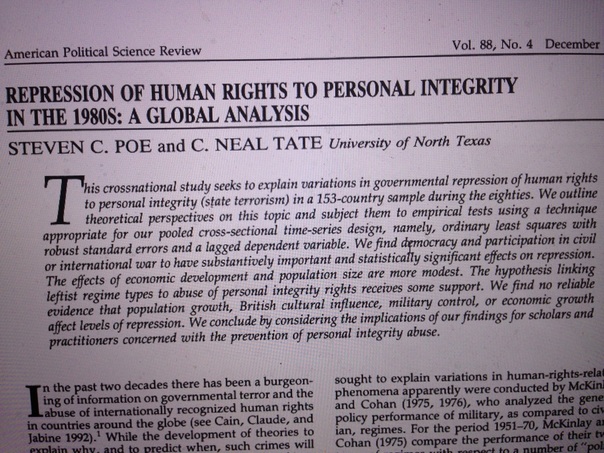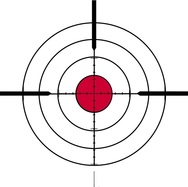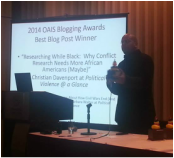Poe and Tate or P&T was significant in many ways:
1) it brought more visibility to a topic that was essentially in its infancy with a few individuals engaged in this work;
2) it employed a sophisticated methodology developed by Neil Beck and Jonathan Katz (presented in a conference paper) to a relatively newish database - the Political Terror Scale; and,
3) it was a much deserved victory lap for the calm, unassuming Steve Poe. (I did not know Neal until much later but never quite as well as I knew his co-author.)
Up to P&T Steve had been cranking it out in the trenches for a while, putting forward some of the most rigorous work on the impact of human rights on US aid. This was perfect for Steve - he was always interested in trying to see how things worked and how they could be improved. He had no problem identifying that this was his wish. This is why he published so much in the Human Rights Quarterly - a journal not as prestigious as the APSR but one he felt was closer to the community that actually tried to do something in the world.
Now, P&T wasn't fabulous (I've perhaps only read and critiqued one other piece as much - Fearon and Laitin [2003]). This should be no surprise. Academics could find wrinkles in heaven/nirvana, after all. There was kind of an a-theoretical vibe to the piece which hit many in the field at the time. Steve attempted to address this limitation later and, to be clear, this was not just a problem for the study of human rights and state repression - by a long shot. Most areas in conflict/violence/peace studies are working out of our structuralist/highly aggregated orientations to address the multi-level as well as dynamic processes presented within the subnational/disaggegated turn.
I recall that after Steve passed there was a roundtable to talk about what would be a fitting remembrance for him as well as a discussion in the Human Rights business meeting (my more proximate thoughts are here). I was hoping that our remembrance would not take the form of a paper or book award because this is seemingly what everyone does and he demanded so much more. Of course, this is what the room came up with. I said that we should at least include a presentation on human rights to an undergrad class or a high school club along with the award. This was something that Steve would have liked. Indeed, I never saw anyone as engaged with their students (except perhaps Will Moore). The award was put forward and I dedicated my webpage (physical embodiment of my life's work) to Steve (and Chuck Tilly).
In this spirit and in remembrance of Steve, at the 20 year anniversary of his most important piece, I thought it would be appropriate to briefly talk about the study of human rights and state repression looking at the same journal that P&T was published in.
One of the two pieces was published by one of Steve's undergrads - Christopher Fariss, entitled "Respect for Human Rights has Improved Over Time: Modeling the Changing Standard of Accountability". This piece stands out in numerous ways. In contrast to just using the Political Terror Scale as Poe and Tate had done, this work integrates various measures of human rights violation together in order to determine whether repression has gotten better or worse, controlling for the improvement in monitoring agencies. Spoiler alert: Things have gotten better. The application of the new methodology with the sensitivity to addressing an important real world problem would have been applauded by Steve. That this was done by one of his former students would have further pleased him.
Now, while pleased, Steve would be pushing on what explained the improvement. We are not quite sure why repression has gone down and we have not collectively reflected upon this in any detail as the civil warification of conflict and violence studies has essentially crowded out discussion of other phenomena. Is the decline noted by Fariss attributed to the same factors highlighted by Pinker and Goldstein or something else? We don't know. Clearly, distinct phenomena are involved. Steve helps point the way. One of Steve's last papers started to push on the theoretical explanation for state repression drawing on some work by Most and Starr. In this regard, Fariss' paper provides a nice puzzle but not yet the answer.
Danny Hill and Zachary Jones' paper "An Empirical Evaluation of Explanations for State Repression_" similarly fits in with something the Poe (and most likely Tate) would have liked. This piece represents a culmination of 20 years worth of research in an effort to sift through the now dozens of pieces being produced by an even greater number of scholars to see what we know. Employing an equally sophisticated but largely unfamiliar approach as Fariss, it is disclosed that we actually know a little about what influences state repression. For example, some of the most powerful predictors are among the most studied and widely known: civil conflict and particular aspects of democracy. Some of the most powerful predictors are seldom studied and are not as widely known: youth bulges, domestic legal institutions and state reliance on natural resource rents. Interestingly, most of the international variables discussed in the literature as well as within policy and NGO circles do not appear to matter or they matter in unanticipated ways.
The importance of domestic determinants and the instability/irrelevance of international factors might have surprised Steve a bit. He was more of an IR-human rights scholar and I think that he would have liked it if international factors mattered as these are one of the things that external actors can do to stop or lessen what horrible things governments do. This said, he would have appreciated the effort and accepted the challenge to push on this theoretically to figure out what is going on. Why is it that the more domestic variables employed within the Hill and Jones study are the best predictors of state repression? Why do international variables not do better? Beyond the article itself, this is where Steve would have and the broader community should go. We would not have gotten to this however had it not been from the stellar work of Hill and Jones, which (again) Steve would have applauded.
Are these two pieces anomalies? Are we to not see any more repression stuff for another 20 years? I would suggest that this is not the case at all. Indeed, the present glow on the field continues into the most recent year as a few more gems have been put forward. Already there have been two more pieces accepted into the APSR relevant to state repression and human rights violation. One is by Evgeny Finkel entitled "Phoenix Effect of State Repression: Jewish Resistance During the Holocaust". Another is by Emily Ritter and Courtenay Conrad entitled "Preventing and Responding to Dissent: The Observational Challenges of Explaining Strategic Repression". Both of these push the field and discussion in important ways. In a later post I will explore them in greater detail. In the meantime, I end as I began: Poe and Tate are Dead... Long Live Poe and Tate. You are deeply missed but not forgotten.





 RSS Feed
RSS Feed
